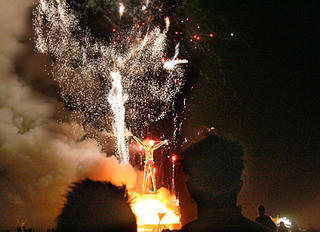(Emergent) Answers for Ed Dobson
On September 12 Brian McLaren, Mike Wittmer, and Ed Dobson engaged in a conversation on the background, current state, challenges, potential, and future direction of the emergent church. All of the sessions were recorded and are available for download in mp3 format. To get them use this [...link]
Of most value (in my opinion) was the Reflections & Questions session which addressed some of the criticisms of the emergent conversation.
The most intriguing was Ed Dobson’s A Pastor’s Reflections (over 60 minutes). Using a very modern approach Ed gives the listener his take on the emergent. He talks, preaches, admits he knows little about the movement (his reference to the conversation), he uses humor and story, but most important are his genuine questions to those of us involved in the conversation.
I’m going to give you Ed Dobson’s questions and then attempt to answer them. I realize your answers and everyone in between will have different answers than mine(emergent is diverse) . But geez this is fun. Here goes--
1. Emergents believe salvation is a process more than an event. But what about the person near death? Does it become an event for them? To bring this all together Dobson tells a story of a woman about to die. He visits her; talks of life & death. Before leaving her bedside he describes how he wrote out a prayer for her. Just before her death the woman came to faith.
Dobson says he agrees that salvation is a process; a journey lived out (what are we becoming?) But when do we talk to people about their salvation. What about heaven and hell?
My answer: I have no problem with this understanding. I hate that many have misunderstood what is being said about process and event. Ninety percent of the time I am a spiritual explorer on equal footing with the one I walk alongside. When a relationship has progressed and matured to the place where trust and comfort are the primary elements in the relationship is when I can be called upon to become a spiritual guide. It is then, and only then, I am given permission to help connect the dots.
2. Dobson asks a thoughtful and probing question:
“I would ask the emerging church in a culture that has moved beyond certainty; where everyone’s story is valued; where truth is sought in community—at what point and on what issues and in what context will you dare speak for God? The prophets spoke for God—they didn’t speak their own opinions, their own ideas. They didn’t form their truth out of a social context—they spoke for God. There comes a point in our journey where in the face of modernity and postmodernity we say—this is what God said.”
My answer: First let me say something about truth being formed in community. This isn’t something unique to postmodernity. It happened in modernity also. The Methodist found truth-in-community when they sprinkled for baptism. The Freewill Baptist found their truth of feet washing in community. The Church of Christ found truth-in-community with their a ccapella doctrine. So, one’s understanding is often formed and matured via the tribe they assemble with. Think independent of your tribe and…well…you know what can happen.
Often this idea of relativism and absolutism is confused with the relativism of the world. The believer, whether pomo or modern has a far different worldview than the unbeliever. So with his comment that the “…emerging church has moved beyond certainty” without knowing he is comparing apples and oranges. Two different beasts.
So his question, “when will you speak for God?” is answered with “I speak for God everyday.”




















